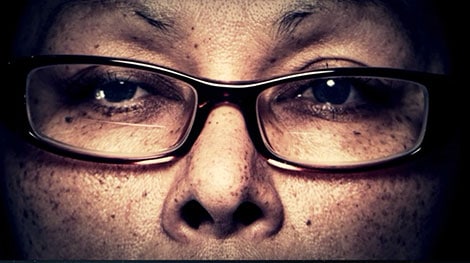I just can’t shut up about this series. There’s a lot in it to think about. Social justice, for example.
Orange is the New Black begins each episode with a changing array of mouths and eyes. These are presumably real female prisoners. Here’s what you notice after a while.
Very few of those eyes are blue. Jenji Kohan is showing us this as a fact: very few blue-eyed people end up in prison.

The opening credits aren’t the only place where we must think about racial justice. When blonde and white Piper Chapman, played by Taylor Schilling, arrives at the prison to surrender herself, a guard assumes she’s a visitor, not a future inmate.
When we look at a white person, we don’t see a future jailbird. Put a little color in a person’s skin and suddenly they are a criminal. Have you seen this video?
Jenji Kohan isn’t quite that obvious in Orange is the New Black, but the evidence is there.
In the prison society in Orange is the New Black, the inmates have divided themselves into “tribes.” These tribes are based on race. Yes, there is a tribe of white people. But the women of color far outnumber them.
The prison officials encourage this system of tribes and allow one person from each tribe to be elected to a council of women who are promised some input into how things are run.
Race isn’t the only issue in the hierarchy of inmates. There are class-based hierarchies within the tribes.
There’s a scene between a white guard played by Lauren Lapkus and the main character, Piper. The guard says that she could be where Piper is – she just never got caught for her bad decisions.
When Piper’s mom visits her in prison, she laments the fact that Piper took a plea bargain and didn’t go to trial. Why? Because people who look like Piper are never convicted in a trial.
On Piper’s first day in prison, she meets the prison counselor Jim Healy, wonderfully portrayed by Michael Harney. He suggests to her that there is no logic in how long sentences are. Someone who committed a minor crime might get 4 years, while someone who committed a more serious crime might get 9 months. He doesn’t say this is based on race, but studies that compare sentences based on race point to statistics like this.
Corruption within the prison system itself is portrayed by Pablo Schreiber as Mendez, the guard, and Alysia Reiner as Figueroa. These people are as crooked as the inmates.
Orange is the New Black tells a great story with characters we love. Still, there’s a lot going on under the surface that bears thinking about and talking about. America’s system of justice is under the microscope in this series.
Have you thought about the justice or injustice of what we see about women in prison as you watch this series? Please share your thoughts.
See Also: Orange is the New Black: A Winner from Netflix and Name Your Favorite Supporting Character from Orange is the New Black.

Leave a Reply